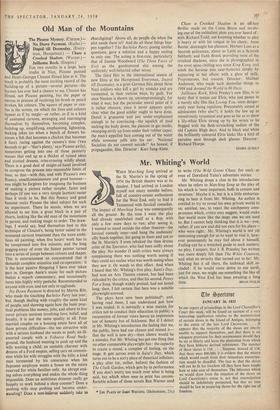Old Man of the Mountains
FOR two months in a large, bare studio in Nice, Picasso painted and Henri-Georges Clouzot filmed him at it. The result is probably the most exciting record of the building-up of a picture—several pictures—the layman has ever had a chance to see. Clouzot has filmed, not Picasso painting, but the paper or canvas in process of receiving his brush or pencil strokes, his colours. The square of paper or can- vas is the screen, on which the lines and colours appear as if by magic—or rather, as if in a kind of animated cartoon, arranging and rearranging themselves by themselves, becoming complex, building up, simplifying, emphasising, lightening, making jokes (as when a bunch of flowers be- comes a fish that becomes a chicken that becomes a face), racing against the camera's time (Iwo seconds to go'—`that's plenty,' says Picasso airily), sometimes getting into one of those painterly messes that end up as a thicket of ruined ideas and stunted dreams, criss-crossing wildly about. There is a good deal of sleight-of-hand involved to compress the process into reasonable limits of time; so that—with this, and with Picasso's own fluency, unselfconsciousness and good humour— one might be forgiven for imagining the business of making a picture rather simpler, faster and perhaps (if one was a very simple layman) easier than it tends to be. But this fluency and good humour make Picasso the ideal subject for such an experiment. There he stands, when we are allowed to see him, a great block in a pair of shorts, looking like the old man of the mountains in person, and making magic to order. The draw- ings, I would say, lend themselves best to this technique of Clouzot's, being better suited to the animated cartoon treatment than the more ambi- tious oil painting, when five hours' work has to be compressed into five minutes, and the long pegging-away of even the fastest painter turned into a series of jumps between colours and shapes. This is entertainment so concentrated that it demands complete attention and co-operation : it is the least passive filmgoing I have ever taken part in. Georges Auric's music for each picture makes a superb commentary, and occasionally• turns into highly witty pastiche. Recommended to anyone with eyes, and not only to eggheads.
No Down Payment is directed by Martin Ritt, who made the touching Bachelor Party last year; but, though dealing with roughly the same kind of people, and showing again how the basic prac- tical problems like money, jobs, and where to live cover private tensions involving love, belief, and loyalty, it is not the same quality at all. Four married couples on a housing estate have all of them private difficulties—the too attractive wife with a serious husband she wants to push; an ill-
. assorted couple with a Tobacco Road back- ground, the husband wanting to push up and the wife wanting a child; an unstable charmer with dreams of a Ford empire, selling cars on commis- sion while his wife struggles with the bills; a kind man tormented by his conscience when his Japanese employee wants a house on the estate reserved for white families only. An abrupt end- ing solves everything and makes the whole thing impossible. Does an ambitious dreamer really go happily to work behind a shop counter? Does a pushing wife stop pushing and become under- standing? Does a non-believer suddenly take to
churchgoing? Above all, do people die when the plot needs them to? And do all these things hap- pen together? The Bachelor Party, posing similar questions, gave a solution and a happy ending to only one. The acting is first-rate, particularly that of Joanne Woodward (The Three Faces of Eve) as the goodnatured slut among the uniformly well-behaved other wives.
The third film in the international season of new films at the Hampstead Everyman, Duped till Doomsday, is a grim German film about three Nazi soldiers who kill a girl by mistake and are tormented, in their various ways, by guilt. For once Nazism is shown up, uncompromisingly, for what it was; but the particular moral point of it is rather obscure, since it never appears quite clear what the good soldier ought to have done. Detail is gruesome and just under-emphasised enough to be convincing—the squelch of mud sucking the body down; the platoon in gas masks, swooping eerily up from under their rubber capes; the man's appalled face coming out of the water while someone yells into his ear : 'National Socialists do not commit suicide!' An honest, if propagandist, film. Director : Kurt Jung-Alsen.
Chase a Crooked Shadow is an off-key thriller made on the Costa Brava and involv- ing one of the unlikeliest plots you ever heard of : with Richard Todd, not knowing whether to play it heavy or with his tongue in his cheek; Anne Baxter, distraught but pleasant; Herbert Lom as a Spanish policeman, about as Latin as a Scottish Sabbath; and Faith Brook providing most of the crooked shadows, since she is photographed in the most spine-chilling way since King Kong, and sends the heroine into near-hysterics simply by appearing at her elbow with a glass of milk. Preposterous, but smooth. Director : Michael Anderson, who made such dissimilar things as 1984 and Around the World in 80 Days, Jailhouse Rock, Elvis Presley's new film, is so nasty that it makes our Elvis, who just passes in a merely silly film like Loving You, seem danger- ously near being repulsive. Presumably aimed at adolescents (who else?), it holds the law up as monstrously tyrannical and goes so far as to show a lily-white Elvis strung up by his wrists to be flogged with the flesh-scrunching sadism of the old Captain Bligh days. And in black and white the brilliantly coloured Elvis looks like a bird of paradise seen through dark glasses. Director : Richard Thorpe.
ISABEL QUIGLY


































 Previous page
Previous page